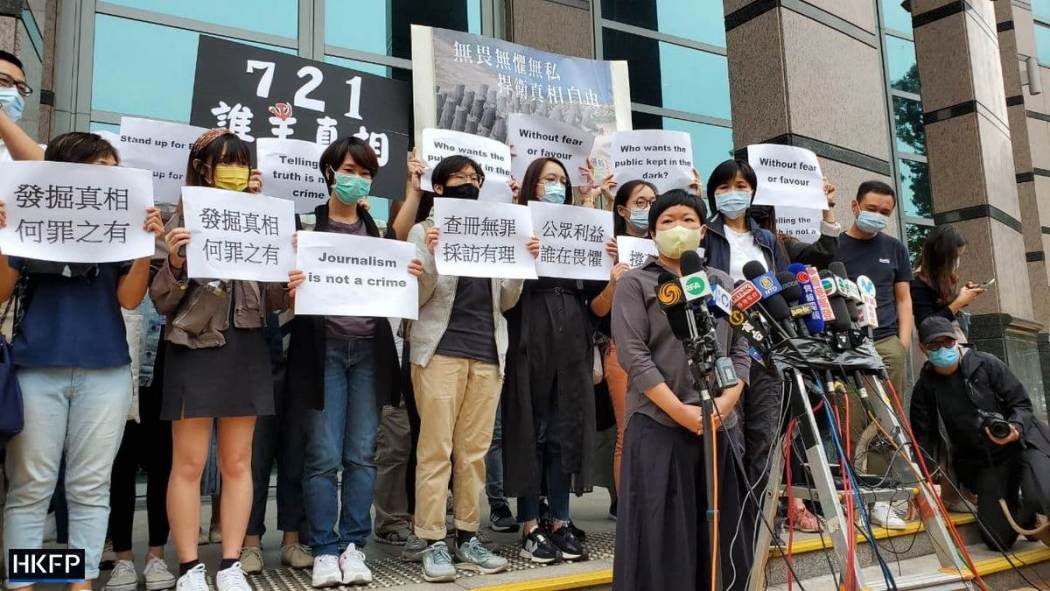Hong Kong documentary producer Choy Yuk-ling said it was normal for journalists to access official records in the public interest, as she appeared in court on Tuesday accused of making false statements while investigating police misconduct during the Yuen Long mob attacks.
Choy, who works for public broadcaster RTHK on a freelance basis, spoke to the press outside Fanling Magistrates’ Court. She was arrested and charged last week with two counts of breaching the Road Traffic Ordinance by making false statements during website searches for information on vehicle licence plates.

The 37-year-old said her case was no longer a personal matter but rather an issue related to the public interest and press freedom in Hong Kong. Following her arrest and prosecution, many press groups, scholars and lawyers raised concerns that police were attempting to suppress the freedom of the press, she said.
They also questioned whether journalists in Hong Kong would still be able to access public information freely in the future.
“There [has] been a very strong understanding and social norm that journalists are free to obtain… public information for the sake of the public interest. I didn’t see any reason that the government [would have] to restrict the flow of information,” Choy said.
The information Choy obtained from the vehicle registration searches was used in an episode of Hong Kong Connection, which uncovered more details about the storming of the Yuen Long MTR station by a mob of over 100 rod-wielding men on July 21 last year.
Police were criticised for arriving at the scene late and accused of colluding with the assailants – some with triad connections – who indiscriminately attacked protesters, civilians, commuters and journalists in the train station. Several other beatings took place in the area, as white-clad men were seen chasing after people with sticks.
The episode that Choy co-produced revealed suspected plainclothes police were present in Yuen Long before the mob attacks, but they took no action when some men – with weapons in their hands – walked past them. The force later admitted it had sent officers to the area to “survey the situation, conduct risk assessments and plan their operation.”
Representatives from the RTHK Programme Staff Union and other supporters held placards and chanted slogans to show solidarity with Choy. The signs read “Journalism is not a crime” and “Telling the truth is not a crime.”
The RTHK freelancer thanked her supporters, saying: “I truly believe that I will never walk alone.”
Asked about possible support from the management of RTHK, a publicly-funded government department, Choy said the Civil Service Bureau had made it clear it would not provide legal assistance to contributors like her, who are not considered government employees.

She said her case again showed the dilemma faced by RTHK, which is both a media organisation officially dedicated to independent reporting and a government department. If RTHK demonstrated courage and willingness to bear the consequences of the incident, she said, “I think that would effectively boost the morale of staff and show its integrity as a media organisation.”
Choy’s case was adjourned to January 14 after the prosecution said it needed time for police to complete investigations and seek instructions from the Department of Justice, including retrieving records of electronic authentication from the Transport Department. She was granted bail in the sum of HK$1,000.
Additional reporting: Candice Chau.
Support HKFP | Policies & Ethics | Error/typo? | Contact Us | Newsletter | Transparency & Annual Report | Apps
Help safeguard press freedom & keep HKFP free for all readers by supporting our team

LATEST FROM HKFP
HKFP has an impartial stance, transparent funding, and balanced coverage guided by an Ethics Code and Corrections Policy.
Support press freedom & help us surpass 1,000 monthly Patrons: 100% independent, governed by an ethics code & not-for-profit.












